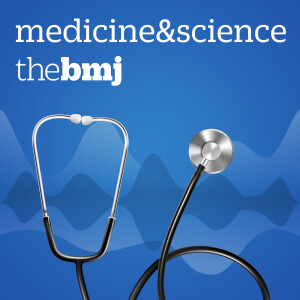
Medicine and Science from The BMJ
Health & Fitness:Medicine

1.00) Carl has been looking at PCR testing, and explains why it picks up both viable SARS-cov-2, but also fragments of it’s RNA - leading to potential over diagnosis.
(8.50 ) What did the Living systematic review and accompanying guidelines say about treatment options for covid-19
(14.35) Helen talks to Reed Siemieniuk, general internist from McMaster University, about creating a living network meta-analysis, to try and synthesis all the evidence on covid-19
(22.48) Helen also talks to Bram Rochwerg, associate professor at McMaster University and
consultant intensivist at Hamilton Health Sciences, about turning the outcomes of a meta-analysis into guidelines, and why at the moment they’re still calling for more evidence on Remdesivir
(30.08) Finally, there are worries about the uncertainty expressed in the living review - and in the way in which we communicate that. Helen goes back to Reed to find out how the review might evolve in the future.
(33.50) Covid isn’t just an acute disease, there is emerging consensus that it’s systemic effects lead to long term problems for some patients - but there’s a lot of uncertainty there.
(38.40) Carl talks about the IMMDS review and his involvement in it - and what recommendations we’ll be covering in future Talk Evidence programmes.
Reading list:
Drug treatments for covid-19: living systematic review and network meta-analysis -https://www.bmj.com/content/370/bmj.m2980
Remdesivir for severe covid-19: a clinical practice guideline - https://www.bmj.com/content/370/bmj.m2924
view more
Management of post-acute covid-19 in primary care - https://www.bmj.com/content/370/bmj.m3026
More Episodes
Lockdown lessons from an Antarctic winter
 2020-12-04
2020-12-04
 2020-12-04
2020-12-04
Corona virus second wave - Fears for tiers
 2020-12-02
2020-12-02
 2020-12-02
2020-12-02
Wellbeing - Dreading the second wave
 2020-10-20
2020-10-20
 2020-10-20
2020-10-20
012345678910111213141516171819
Create your
podcast in
minutes
- Full-featured podcast site
- Unlimited storage and bandwidth
- Comprehensive podcast stats
- Distribute to Apple Podcasts, Spotify, and more
- Make money with your podcast
It is Free
- Privacy Policy
- Cookie Policy
- Terms of Use
- Consent Preferences
- Copyright © 2015-2024 Podbean.com





